《人教版新目标英语》七年级上下全册重点句型、短语一览表1
- 格式:doc
- 大小:197.39 KB
- 文档页数:32
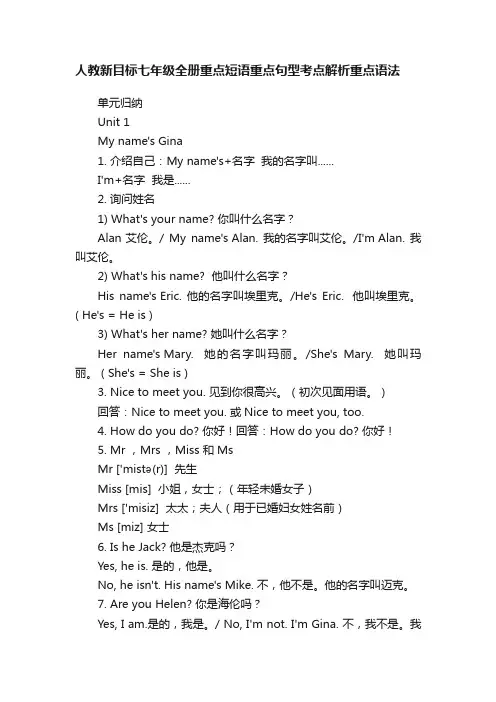
人教新目标七年级全册重点短语重点句型考点解析重点语法单元归纳Unit 1My name's Gina1. 介绍自己:My name's+名字我的名字叫......I'm+名字我是......2. 询问姓名1) What's your name? 你叫什么名字?Alan艾伦。
/ My name's Alan. 我的名字叫艾伦。
/I'm Alan. 我叫艾伦。
2) What's his name? 他叫什么名字?His name's Eric. 他的名字叫埃里克。
/He's Eric. 他叫埃里克。
( He's = He is )3) What's her name? 她叫什么名字?Her name's Mary. 她的名字叫玛丽。
/She's Mary. 她叫玛丽。
( She's = She is )3. Nice to meet you. 见到你很高兴。
(初次见面用语。
)回答:Nice to meet you. 或Nice to meet you, too.4. How do you do? 你好!回答:How do you do? 你好!5. Mr ,Mrs ,Miss 和MsMr ['mistə(r)] 先生Miss [mis] 小姐,女士;(年轻未婚女子)Mrs ['misiz] 太太;夫人(用于已婚妇女姓名前)Ms [miz] 女士6. Is he Jack? 他是杰克吗?Yes, he is. 是的,他是。
No, he isn't. His name's Mike. 不,他不是。
他的名字叫迈克。
7. Are you Helen? 你是海伦吗?Yes, I am.是的,我是。
/ No, I'm not. I'm Gina. 不,我不是。
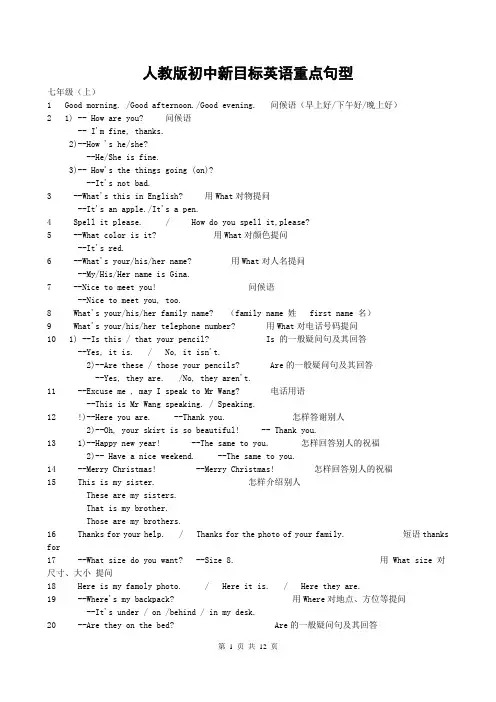
人教版初中新目标英语重点句型七年级(上)1 Good morning. /Good afternoon./Good evening. 问候语(早上好/下午好/晚上好)2 1) -- How are you? 问候语-- I'm fine, thanks.2)--How 's he/she?--He/She is fine.3)-- How's the things going (on)?--It's not bad.3 --What's this in English? 用What对物提问--It's an apple./It's a pen.4 Spell it please. / How do you spell it,please?5 --What color is it? 用What对颜色提问--It's red.6 --What's your/his/her name? 用What对人名提问--My/His/Her name is Gina.7 --Nice to meet you! 问候语--Nice to meet you, too.8 What's your/his/her family name? (family name 姓 first name 名)9 What's your/his/her telephone number? 用What对电话号码提问10 1) --Is this / that your pencil? Is 的一般疑问句及其回答--Yes, it is. / No, it isn't.2)--Are these / those your pencils? Are的一般疑问句及其回答--Yes, they are. /No, they aren't.11 --Excuse me , may I speak to Mr Wang? 电话用语--This is Mr Wang speaking. / Speaking.12 !)--Here you are. --Thank you. 怎样答谢别人2)--Oh, your skirt is so beautiful! -- Thank you.13 1)--Happy new year! --The same to you. 怎样回答别人的祝福2)-- Have a nice weekend. --The same to you.14 --Merry Christmas! --Merry Christmas! 怎样回答别人的祝福15 This is my sister. 怎样介绍别人These are my sisters.That is my brother.Those are my brothers.16 Thanks for your help. / Thanks for the photo of your family. 短语thanks for17 --What size do you want? --Size 8. 用 What size 对尺寸、大小提问18 Here is my famoly photo. / Here it is. / Here they are.19 --Where's my backpack? 用Where对地点、方位等提问--It's under / on /behind / in my desk.20 --Are they on the bed? Are的一般疑问句及其回答--Yes, they are. / No, they aren't.21 Please take those things to you sister. take 的用法及其意义22 -- I'm sorry ( I am late). --It doesn't matter. / That's all right./ Never mind. (sorry 及其回答)23 --Can you bring some things to school? can的一般疑问句及其回答--Yes,I can. / No,I can't.24 --Do you have a soccer ball? do的一般疑问句及其回答--Yes, I do. / No, I don't.25 I don't have a soccer ball. Don’t表否定I don't have any soccer balls. any 用在否定句26 --Does she/he have a soccer ball? does的一般疑问句及其回答--Yes, she/he does. No, she/he doesn't.27 1)--Mum, I have finished my homework well. -- Well done. 怎样夸赞、祝贺别人2)--Mike, I got the first prize in the English competion!-- Congraduations!28 --Let's play volleyball! --That sounds interesting. 表建议及其回答29 1)-- Good luck with your math test! --Thank you. 怎样答谢别人2)--Best wishes for you! --Thank you.30 For breakfast,she likes an egg, a banana and some apples. For breakfast 应注意31 --How much are these pants? --They are 20 dollars. How much对价格提问32 --How much potatoes do you want? --Three kilos. How much 对不可数名词多少提问33 --Can I help you,Sir? --Yes, please. I want a sweater. 买卖双方的用语34 OK,I'll take it. (我买了)35 --Thank you very much. / Thanks a lot. (谢谢的表达方式)--You'ra welcome. / That's all right. / Not at all. (不用谢的表达方式)36 I like English very much. 表示“非常”喜欢、想要、想念的表达I want a bike very much.I miss you very much.37 We have great bags for only 2 dollars. 用for表示价格38 Anybody can afford our prices. 不定代词的用法Everyone can afford to buy them.39 --When is your birthday? 用When 对时间提问--My birthday is October twelfth.40 --How old are you /they ? How old is he/ she? 用How old 对年龄大小提问--I'm /We're/They're /He's/She's 12 (years old.)年龄的表示方法41 --Do you want to go to a movie? Want 的用法--Yes,I do.I want to see a comedy/an action movie.42 --What kind of movies do you like? What kind of 对种类提问--I like action movies and documentaries.43 She thinks she can learn about Chinese history. Think 后的宾语从句44 I often go for a walk with my friends on Sunday mornings. go for a walk 去散步 on的用法45 My favorite actor is Jet Lee. Favorite 的意义、词性等46 --What club do you want to join? Club 俱乐部--I want to join the misc club.47 Can you help the kids with swimming? (Help…with … 在… 方面帮助…)48 --Could you get me some salt? Could 的一般疑问句及其回答--Yes, I can./I'd love to./ My pleasure.49 You can be in the school music festival. Be in 在这里的意义50 Please call Bill at 7787070. 注意介词at51 May I know your name, please? 礼貌地询问别人的名字52 --What time do you usually get up in the morning? What time对(具体)时间提问--I usually get up at half past six.53 What a funny time to eat lunch! How、 what感叹句的应用What a beautiful girl she is !How beautiful she is!54 He takes the number 12 ( No.12 ) bus to school. 乘第几路车的表达55 People love to listen to him. (听)56 He goes to bed at 8:30 every night. (去睡觉)57 --What's your favorite subject? 对喜好提问--My favorite subject is science.58 --Why do you like math? Why的问句及其回答--Because it's interesting.59 --Who is your science teacher? Who对人提问及其回答--My science teacher is Mr Wang.60 --When do you have math? When对时间提问及其回答-- I have math on Monday.61 September is the ninth month of year. 序数词的用法、意义、写法62 It's very exciting to have a Chinese friend. 形式主语结构七年级(下)63 --Where is your pen pal from? Be …from来自--She is from Japan.64 --What language can they speak? 操…语言--They can speak English and a little French. a little表示“一点”,后接不可数65 --Does she have any brothers and sisters? (Some 、any 在一般疑问句、肯定句、 --Yes, she has some. 否定句中的用法)66 --Would you like a cup of tea or an apple? Or 用于选择疑问句--A cup of tea, please.67 --Is there a bank near here? There be 句型的一般疑问句及其回答--Yes, there is. / No, there isn't.68 The pay phone is across from / next to / in front of the library.(在…的对面/挨着/在…前面)It's down the Bridge street on the right. (在右边)69 Take a walk through the park on Center Avenue. Through “穿过”的用法意义70 --What's the date today? --It's October ninth today. 对日期提问71 --What day is it today? --Today is Wednesday. 对星期提问72 Next to the hotel is a small house with an interesting garden. 介词with短语作定语73 This is the beginning of the garden tour. (起初/…的开始)74 Bridge Street is a good place to have fun. 不定式作定语75 Let me tell you the way to my house. (去我家的路)76 I hope you have a good trip. (我祝你一路好走)77 My work is interesting but kind of dangerous. (有点儿)78 What other animal do you like? (其它的动物)79 --What do you want to be? 对想干什么提问--I want to be an actor.80 1)--What do you do? / What are you? 对职业提问--I'm a teacher.2)--What does she do? / What is she?-- She is a doctor.81 We have a job for you as a waiter. (作为一名服务生)82 --What are you doing? 对正在作什么提问--I'm watching TV.83 --What is he waiting for? (等待)--He is waiting for a bus.84 --Who is he talking to? (跟…说话 to 的对象是who)--He is talking to Mary.85 I'm sorry to have to say that, but the room is too dirty. 表示礼貌的对对方批评指正86 --How's the weather in Beijing? / What's the weather like in Beijing? 对天气提问--It's snowing.87 The weather in Beijing is colder than that in Shanghai. 注意that在此类比较级中的用法88 1)--I think so. -- I don't think so. 注意so 和not 在这些简略句中的意义2)--I hope so. --I hope not.3)--I suppose so --I suppose not4)--I guess so. --I guess not.5)--I'm afraid so. --I'm afraid not.6)--I believe so. --I believe not.89 There are many people here on vacation, some are taking photos, others are lying on the beach. Some …others 表示“一些另一些”90 Everyone is having a good time. (每一个人都玩得开心)不定代词Everyone作主语,谓语用单数91 I'm surprised they can play in this heat. 本句作surprised宾语,叫宾语从句92 The library is between the hotel and the mall. (在两者之间)93 --What does your friend look like? 对别人的外貌长相提问--She is medium height and she has long hair.94 She is good-looking, but she's a little bit quiet. (有一点安静)95 --What is she like? --She is shy but hard-working. 对性格提问及回答96 I don't think he is so great. 否定提前句,指的是he is so great本身是否定句,但not 不能放在从句,而要放在I 与think 之间。
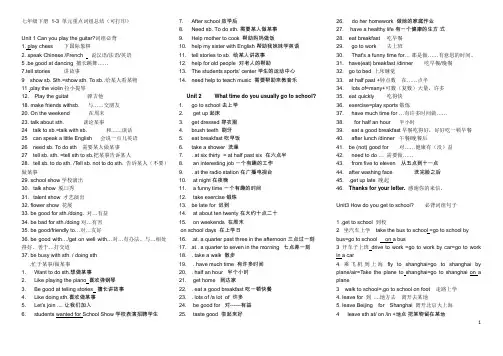
七年级下册1-3 单元重点词组总结(可打印)Unit 1 Can you play the guitar?词组必背1. play chess 下国际象棋2. speak Chinese /French 说汉语/法语/英语5 .be good at dancing 擅长跳舞……7.tell stories 讲故事9 show sb. Sth.=show sth. To sb..给某人看某物11 .play the violin拉小提琴12. Play the guitat 弹吉他18. make friends withsb. 与……交朋友20. On the weekend 在周末23. talk about sth. 谈论某事24 talk to sb.=talk with sb. 和.......谈话25 can speak a little English 会说一点儿英语26 need sb. To do sth 需要某人做某事27 tell sb. sth. =tell sth to sb.把某事告诉某人28. tell sb. to do sth. /Tell sb. not to do sth. 告诉某人(不要)做某事29. school show学校演出30. talk show 脱口秀31. talent show 才艺演出32. flower show 花展33. be good for sth./doing. 对…有益34. be bad for sth./doing对…有害35. be good/friendly to…对…友好36. be good with…/get on well with…对…有办法、与…相处得好、善于…打交道37. be busy with sth. / doing sth.忙于某事/做某事1. Want to do sth.想做某事2. Like playing the piano 喜欢弹钢琴3. Be good at telling stories 擅长讲故事4. Like doing sth.喜欢做某事5. Let’s join .... 让我们加入6. students wanted for School Show学校表演招聘学生7. After school放学后8. Need sb. To do sth. 需要某人做某事9. Help mother to cook 帮助妈妈做饭10. help my sister with English 帮助我妹妹学英语11. tell stories to sb. 给某人讲故事12. help for old people 对老人的帮助13. The students sports’ center学生的运动中心14. need help to teach music 需要帮助来教音乐Unit 2 What time do you usually go to school?1. go to school 去上学2. get up 起床3. get dressed 穿衣服4. brush teeth 刷牙5. eat breakfast 吃早饭6. take a shower 洗澡7. . at six thirty = at half past six 在六点半8. an interesting job 一个有趣的工作9. . at the radio station 在广播电视台10. at night 在夜晚11. a funny time 一个有趣的时间12. take exercise 锻炼13. be late for 迟到14. at about ten twenty 在大约十点二十15. on weekends 在周末on school days 在上学日16. .at. a quarter past three in the afternoon 三点过一刻17. at . a quarter to seven in the morning 七点差一刻18. . take a walk 散步19. . have much time 有许多时间20. . half an hour 半个小时21. get home 到达家22. . eat a good breakfast 吃一顿快餐23. . lots of /a lot of 许多24. be good for 对------有益25. taste good 尝起来好26. do her homework 做她的家庭作业27. have a healthy life 有一个健康的生方式28. eat breakfast 吃早餐29. go to work 去上班30. That's a funny time for…那是做……有意思的时间。

七下1—6单元必背句子与词组Unit1 Where’s your pen pal from? (ok)1. --你的笔友来自哪里? -- Where is your pen pal from? (无“实义动词e, 用is/are”) --他来自加拿大。
-- He/She is from Canada.同义句:-- Where does your pen pal e from? (有“实义动词e, 用do/does”) -- He/She es from Canada.来自:be from = e from练:They’re _______ Australia, a beautiful country.A. e fromB. es fromC. fromD. for2. --你的笔友来自加拿大吗?-- Is your pen pal from Canada? (用法同上)--是的。
-- Yes, he/she is.同义句:-- Does your pen pal e from Canada? (用法同上) -- Yes, he/she does.3. 他来自澳大利亚:He is from Australia. 他是澳大利亚人:He is Australian.4. --你的笔友住在哪里?-- Where does your pen pal live?--他住在多伦多。
-- He/She lives in Toronto.居住在某地:live in sp练:-- When _____ the girl _____ her homework? -- In the evening.A. does, doesB. does, doC. is, doD. is, does-- _______ your sister have a pen pal? Yes, she _______.A. Is, isB. Does, doC. Can, canD. Does, does-- Ling Tao is a Chinese, but now he _______ in the UK.A. liveB. isC. is fromD. es from5. --你的笔友说什么语言?-- What language does your pen pal speak?--他说英语。
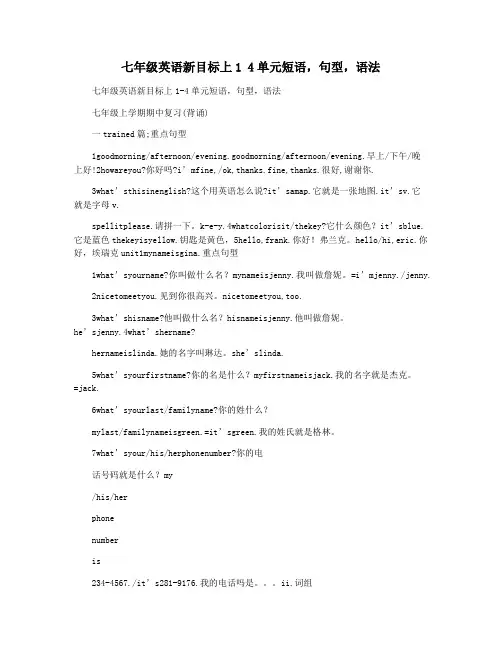
七年级英语新目标上1 4单元短语,句型,语法七年级英语新目标上1-4单元短语,句型,语法七年级上学期期中复习(背诵)一trained篇;重点句型1goodmorning/afternoon/evening.goodmorning/afternoon/evening.早上/下午/晚上好!2howareyou?你好吗?i’mfine,/ok,thanks.fine,thanks.很好,谢谢你.3what’sthisinenglish?这个用英语怎么说?it’samap.它就是一张地图.it’sv.它就是字母v.spellitplease.请拼一下。
k-e-y.4whatcolorisit/thekey?它什么颜色?it’sblue.它是蓝色thekeyisyellow.钥匙是黄色,5hello,frank.你好!弗兰克。
hello/hi,eric.你好,埃瑞克unit1mynameisgina.重点句型1what’syourname?你叫做什么名?mynameisjenny.我叫做詹妮。
=i’mjenny./jenny.2nicetomeetyou.见到你很高兴。
nicetomeetyou,too.3what’shisname?他叫做什么名?hisnameisjenny.他叫做詹妮。
he’sjenny.4what’shername?hernameislinda.她的名字叫琳达。
she’slinda.5what’syourfirstname?你的名是什么?myfirstnameisjack.我的名字就是杰克。
=jack.6what’syourlast/familyname?你的姓什么?mylast/familynameisgreen.=it’sgreen.我的姓氏就是格林。
7what’syour/his/herphonenumber?你的电话号码就是什么?my/his/herphonenumberis234-4567./it’s281-9176.我的电话吗是。

《英语(新目标)》教材重点句型、短语一览表*标记为听力材料语句七年级(上册)(Starter) Unit 1 Good morning!Ⅰ. Sentences:1. Good morning, Alice! 早上好,艾丽斯!2. Good morning, Cindy! 早上好,辛蒂!3. Hello, Frank! 你好,弗兰克!4. Hi, Cindy! How are you? 嗨,辛蒂!你好吗?I’m fine, thanks. 我很好,非常感谢。
5. Good afternoon, Eric! 下午好,埃里克!6. Good evening, Alice! 下午好,艾丽斯!7. I’m OK. 我还不错。
/我很好。
I’m = I am 我是(Starter) Unit 2 What’s this in English?Ⅰ、Useful expressions:1. in English 用英语(说),在英语方面2. an orange一个桔子Ⅱ、Sentences:1. What’s this in English? 用英语说这是什么?It’s a key. 这(它)是一把钥匙。
2. Spell it, please. 请拼读一下它。
K-E-Y. K-E-Y.what’s = what is 是什么it’s = it is 它(这,那)是(Starter) Unit 3 What color is it?Ⅰ、Useful expressions:1. A in Grace 格雷斯中的AⅡ、Sentences:1. What’s this? 这是什么?It’s V. 这是V。
2. What color is it? 它是什么颜色?It’s red. 它是红色的。
3. It’s black and white. 它是黑白相间的。
Unit 1 My name’s Gina.Ⅰ、Useful expressions:1. my/his/her name 我的/他的/她的名字2. name’s = name is 名字是,名叫做3. (my/your/his/her) first name(我的/你的/他的/她的)名字4. (my/your/his/her) last name (我的/你的/他的/她的)姓氏family name = last name 姓氏5. ID card 身份证Ⅱ、Sentences:1. What’s your name? 你叫什么名字?2. My name’s Gina. 我的名字叫吉娜。
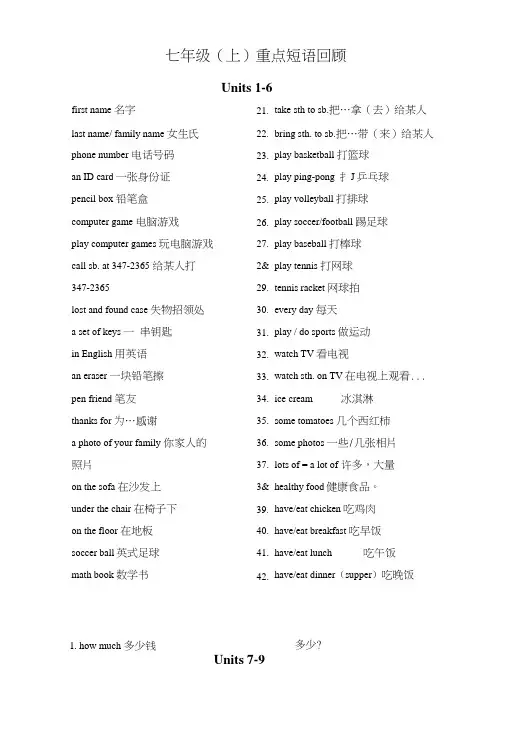
七年级(上)重点短语回顾Units 1-6first name 名字21. take sth to sb.把…拿(去)给某人last name/ family name 女生氏22. bring sth. to sb.把…带(来)给某人phone number 电话号码23. play basketball 打篮球an ID card 一张身份证24. play ping-pong 扌J乒乓球pencil box 铅笔盒25. play volleyball 打排球computer game 电脑游戏26. play soccer/football 踢足球play computer games 玩电脑游戏27. play baseball 打棒球call sb. at 347-2365 给某人打2& play tennis 打网球347-2365 29. tennis racket 网球拍lost and found case 失物招领处30. every day 每天a set of keys 一串钥匙31. play / do sports 做运动in English 用英语32. watch TV 看电视an eraser 一块铅笔擦33. watch sth. on TV在电视上观看... pen friend 笔友34. ice cream 冰淇淋thanks for 为…感谢35. some tomatoes 几个西红柿a photo of your family 你家人的36. some photos 一些/几张相片照片37. lots of = a lot of 许多,大量on the sofa 在沙发上3& healthy food健康食品。
under the chair 在椅子下39. have/eat chicken 吃鸡肉on the floor 在地板40. have/eat breakfast 吃早饭soccer ball英式足球41. have/eat lunch 吃午饭math book 数学书42. have/eat dinner(supper)吃晚饭1. how much 多少钱多少?Units 7-92.what's the price of ...的价格是3. Here you are.给你youTe welcome. 不客气;不用10. at a good price 价格合适谢11. be on sale大廉销,大减价have a look at... 看看…12. birthday party 生日聚会bags for sports 运动包13. date of birth (=birthday )生日two dollars 两美元14. school trip 郊游,校游seven yuan 七元(人民币)15. school day 作息口,校口what color什么颜色16. basketball game 篮球赛Art Festival 艺术节29. like to do sth\ like doing sth 喜how old 儿岁欢做某事fifteen years old 15 岁30. let sb. do sth.让某人做某事go to school 去上学31. on Monday 在周一go to bed去睡觉32. on May 2nd 在五月二日get up起床33. on Sunday morning 在星期天上what time /when 儿点钟午go home 回家34. at home 在家do homework 做作业have math上数学课35. November + •月English teacher 英语老师want to do sth.想要做某事36. December 十二月七年级上册英语语法人称代词与物主代词一.动词be (is, am, are)的用法我⑴用am,你(you)用are, is用于他(he),她(she),它(it)。
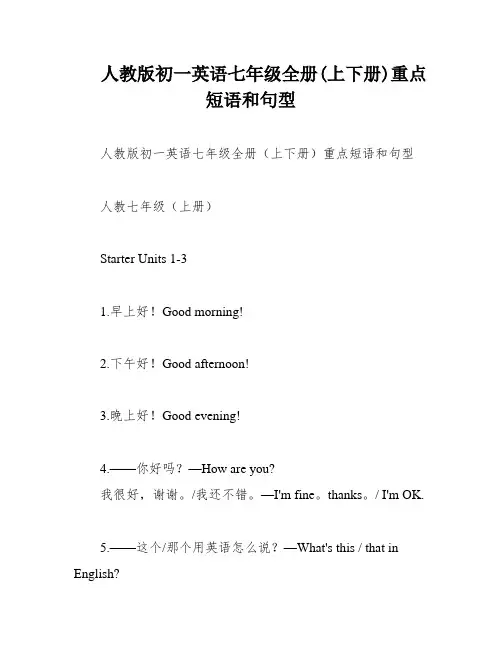
人教版初一英语七年级全册(上下册)重点短语和句型人教版初一英语七年级全册(上下册)重点短语和句型人教七年级(上册)Starter Units 1-31.早上好!Good morning!2.下午好!Good afternoon!3.晚上好!Good evening!4.——你好吗?—How are you?我很好,谢谢。
/我还不错。
—I'm fine。
thanks。
/ I'm OK.5.——这个/那个用英语怎么说?—What's this / that in English?是……—It's a / an。
6.请拼写它。
Spell it。
please.7.——它是什么颜色的?—What color is it? 它是……色的。
—It's。
Unit 1n A1.我是……I'm。
2.你是……吗?Are you。
3.他/她是……He / She is。
4.——见到你很高兴。
—Nice to meet you.见到你我也很高兴。
—Nice to meet you。
too.5.——你/他/她叫什么名字?—What's your / his / her name?我/他/她叫……—My / His / Her name is。
n B1.名字first name2.姓last name3.在中国in China4.学生卡ID card5.这是你的号码吗?Is this your number?6.——你的电话号码是多少?—What's your telephone / phone number?是……—It's。
Unit 2n A1.家庭照片family photos2.这是/那是/这些是/那些是……This is / That is / These are / Those are。
3.她/他是谁?Who's she / he?4.他们是谁?Who are they?5.祝你过得愉快!Have a good day!6.我知道了。
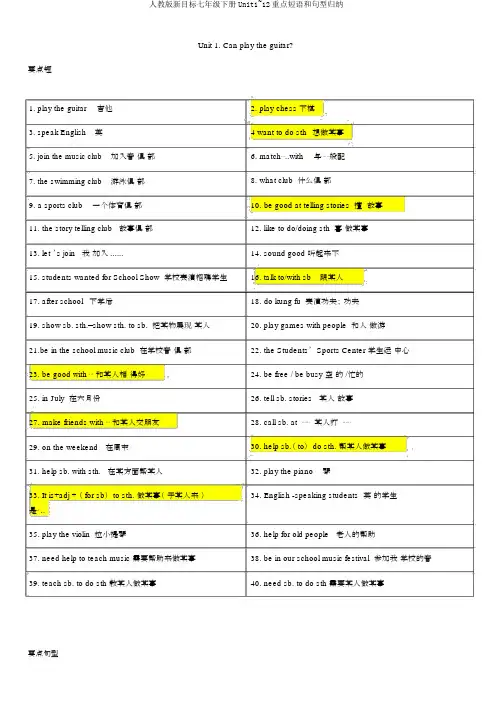
Unit 1. Can play the guitar?要点短1. play the guitar 吉他2. play chess 下棋3. speak English 英 4 want to do sth 想做某事5. join the music club 加入音俱部6. match⋯..with 与⋯⋯般配7. the swimming club 游泳俱部8. what club 什么俱部9. a sports club 一个体育俱部10. be good at telling stories 擅故事11. the story telling club 故事俱部12. like to do/doing sth 喜做某事13. let ’s join 我加入 ...... 14. sound good 听起来不15. students wanted for School Show 学校表演招聘学生16. talk to/with sb 跟某人17. after school 下学后18. do kung fu 表演功夫;功夫19. show sb. sth.=show sth. to sb. 把某物展现某人20. play games with people 和人做游21.be in the school music club 在学校音俱部22. the Students’ Sports Center 学生运中心23. be good with ⋯和某人相得好24. be free / be busy 空的 /忙的25. in July 在六月份26. tell sb. stories 某人故事27. make friends with ⋯和某人交朋友28. call sb. at ⋯⋯某人打⋯⋯29. on the weekend 在周末30. help sb.( to) do sth. 帮某人做某事31. help sb. with sth. 在某方面帮某人32. play the piano 琴33. It is+adj + ( for sb) to sth. 做某事(于某人来)34. English -speaking students 英的学生是⋯..35. play the violin 拉小提琴36. help for old people 老人的帮助37. need help to teach music 需要帮助来做某事38. be in our school music festival 参加我学校的音39. teach sb. to do sth 教某人做某事40. need sb. to do sth 需要某人做某事要点句型1.— Can you swim? 你会游泳?— No , I can’ t.不,我不会。
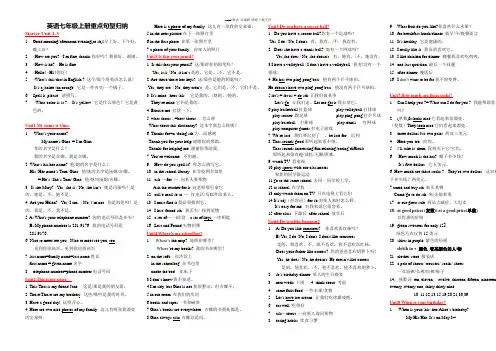
word格式-可编辑-感谢下载支持英语七年级上册重点句型归纳Starter Unit 1-31.Good morning/afternoon/evening(to sb)!早上好,下午好,晚上好!2.–How are you? –I’m fine, thanks.你好吗?我很好,谢谢。
3.–How is he? – He is fine.4.–Hello! –Hi !你好!5.–What’s this/that in English ? 这个/那个用英语怎么说?It’s a jacket./an orange. 它是一件夹克/一个橘子。
6.Spell it, please. 请拼写。
7.--What color is it ? – It’s yellow. 它是什么颜色?它是黄色的。
Unit1 My name is Gina.1.-What’s your name?-My name's Gina. = I’m Gina.你的名字是什么?我的名字是吉娜。
我是吉娜。
2.-What’s his/her name? 他/她的名字是什么?- His /Her name’s Tom/ Gina. 他/她的名字是汤姆/吉娜。
= He’s /She’s Tom/ Gina. 他/她叫汤姆/吉娜。
3.- Is she Mary? –Yes, she is./ No, she isn’t. 她是玛丽吗?是的,她是。
不,她不是。
4.-Are you Helen? –Yes, I am。
/ No, I’m not. 你是海伦吗?是的,我是。
不,我不是。
5. A: What's your telephone number? 你的电话号码是多少?B: My phone number is 281-9176. 我的电话号码是281-9176。
6.-Nice to meet/see you. -Nice to meet/see you, too.见到你很高兴。
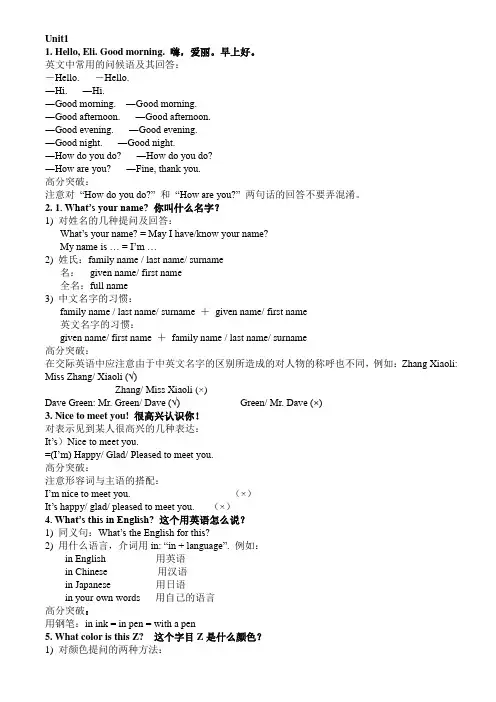
Unit11. Hello, Eli. Good morning. 嗨,爱丽。
早上好。
英文中常用的问候语及其回答:-Hello. -Hello.―Hi. ―Hi.―Good morning. ―Good morning.―Good afternoon. ―Good afternoon.―Good evening. ―Good evening.―Good night. ―Good night.―How do you do? ―How do you do?―How are you? ―Fine, thank you.高分突破:注意对“How do you do?” 和“How are you?” 两句话的回答不要弄混淆。
2. 1. What’s your name? 你叫什么名字?1) 对姓名的几种提问及回答:What’s your name? = May I have/know your name?My name is … = I’m …2) 姓氏:family name / last name/ surname名:given name/ first name全名:full name3) 中文名字的习惯:family name / last name/ surname +given name/ first name英文名字的习惯:given name/ first name +family name / last name/ surname高分突破:在交际英语中应注意由于中英文名字的区别所造成的对人物的称呼也不同,例如:Zhang Xiaoli: Miss Zhang/ Xiaoli (√)Zhang/ Miss Xiaoli (×)Dave Green: Mr. Green/ Dave (√) Green/ Mr. Dave (×)3. Nice to meet you! 很高兴认识你!对表示见到某人很高兴的几种表达:It’s)Nice to meet you.=(I’m) Happy/ Glad/ Pleased to meet you.高分突破:注意形容词与主语的搭配:I’m nice to meet you. (×)It’s happy/ glad/ pleased to meet you. (×)4. What’s this in English? 这个用英语怎么说?1) 同义句:What’s the English for this?2) 用什么语言,介词用in: “in + language”. 例如:in English 用英语in Chinese 用汉语in Japanese 用日语in your own words 用自己的语言高分突破:用钢笔:in ink = in pen = with a pen5. What color is this Z? 这个字目Z是什么颜色?1) 对颜色提问的两种方法:What color …? = What’s the color of …? 例如:What color is your purse? = What the color of your purse?2) color v. 着色color sth. + 颜色, 例如:I want to color it red.高分突破:1)对名词(复数)的颜色提问时,不能用what colors,例如:What color are these cups? (√)What colors are these cups? (×)2) color是可数名词,例如:I don’t like these colors.Unit21. Is this your dictionary? 这是你的字典吗?回答:Yes, it is. / No, it isn’t.Is this/that ...?Yes, it is. / No, it isn’t. (√)Yes, this/that is. / No, this/that isn’t. (×)例如:Is that your brother’s backpack?Yes, it is.高分突破:-Is this/that + 人?-Yes, it is. / No, it isn’t. (√)-Yes, he/she is. / No, he/she i sn’t. (×)2. Call John at 495-3539. 给约翰打电话495-3539。
1.play chess 下国际象棋2.play the guitar 弹吉他3.speak English 说英语4.English club 英语俱乐部5.talk to 跟…说6.play the violin 拉小提琴弹钢琴8.play the drums 敲鼓9.make friends 结交朋友10.do kung fu 会(中国)功夫11.tell stories 讲故事12.play games 做游戏13.on the weekends (在)周末1.play +棋类/球类下……棋,打……球2.play the +西洋乐器弹/拉……乐器3.be good at doing sth.= do well in doing sth. 擅长做某事4.be good with sb. 善于与某人相处5.need sb. To do sth. 需要某人做某事6.can + 动词原形能/会做某事7. a little + 不可数名词一点儿……8.join the …club 加入…俱乐部9.like to do sth. =love to do sth. 喜欢/喜爱做某事10.like ding sth.喜欢做某事1.Can you draw? Yes, I can. / No, I can’t.2.What club do you want to join? I want to join thechess club.3.You can join the English club.4.Sounds good.5.I can speak English and I can also play soccer.6.Please call Mrs. Miller at 555-3721.9. May I know your name? 我可以知道你的名字吗?点拨:May I know your name?= What’s your name? 但前者是一种更为礼貌的表达,比前者要委婉。
Unit 1 Where’s your pen pal from?一、词汇Canada(名词)Canadaian France(名词)French Japan(名词)Japanese country(复数)countries Australia(名词)Australian China(名词)Chinese 二、词组be from= come form 来自... pen pal=pen friend 笔友live in…..居住speak English 讲英语play sports 做体育运动in November 在十一月a little French 一些法语all over the world全世界on weekends 在周末too difficult 太困难Excuse me 对不起,打扰reach/get to 到达、抵达at the beginning of 在...开始的时候birthday=date of birth 生日want a pen pal 想要一个笔友in school在学校arrive at(小地方) /in(大地方)到达in English用英语at the end of 在...结束的时候action movie 动作片in the world 在世界上go to the movies=go to the cinema =go to see a film去看电影tell sb. about yourself 告述某人关于你write to sb=write a letter to sb给某人写信a very interesting country 一个非常有趣的国家like doing sth/like to do sth 喜欢做某事(前者强调习惯,后者强调一性)dislike doing sth/dislike to do sth 不喜欢做某事(前者强调习惯,后者强调一性)1.Where is your pen pal from?=Where does your pen pal from?你的笔友来自哪儿?She’s from Japan. 她来自日本。
人教新目标英语七年级上册重点短语和句型Starter Units1—3一、重点短语1.good morning/afternoon/evening早上/下午/晚上好2.good night晚安3.thank you=thanks谢谢你4.in English用英语5.in Chinese用汉语5.an orange一个橙子6.a jacket一件夹克7.a UFO一个不明飞行物8.a ruler一把尺子9.a map一张地图10.a quilt一床被子11.a cup一个杯子12.a red pen一支红色的钢笔13.a key一把钥匙14.a purple quilt一床紫色的被子15.a brown key一把棕色的钥匙16.a green jacket一件绿色的夹克17.a blue picture一张蓝色的画18.a yellow ruler一把黄色的尺子19.a black and white TV一台黑白电视20.in the morning在早晨21.in the afternoon在下午22.in the evening在晚上23.at night在午夜二、重点句型1.How are you?你好吗?I'm fine,thanks.我很好,谢谢。
2.And you?=What about you?你呢?I’m OK.我很好3.How is Mike?Mike好吗?He is fine.他很好。
4.-What's this in English?这个用英语怎么说?-I t’s an orange.一个橙子。
5.Spell it,please.=Please spell it.请拼写它。
6.—What color is it?它是什么颜色的?—I t’s red红色的。
7.The key is yellow.这个钥匙是黄色的8.I can say my ABC。
我能说A、B、C等字母了。
《新目标英语》七年级下册重点句型、短语归纳Unit 1 Where ’s your pen pal from?Ⅰ、Useful expressions:1. be from= come from 来自于来自于2. New York 纽约纽约3. the United States 美国美国4. the United Kingdom 英国英国5. one’s (new) pen pal 某人的(新)笔友某人的(新)笔友6. in Paris 在巴黎在巴黎在巴黎7. want a pen pal 想要一个笔友想要一个笔友8. a pen pal in China=a Chinese pen pal 一个在中国的笔友一个在中国的笔友 9. a very interesting country 一个非常有趣的国家一个非常有趣的国家10. in November 在十一月在十一月在十一月 11.speak a little (French) 说一点儿法语说一点儿法语 12. like doing sth. 喜欢做某事喜欢做某事13. go to the movies 去看电影去看电影 14. in school / at school 在学校里在学校里 15. too difficult 太困难太困难太困难 16. write to sb. (soon) = write a letter to sb (soon)(尽快)给某人写信(尽快)给某人写信 17. pen pal wanted 征招笔友征招笔友18. on weekends 在周末在周末在周末 19. at school 在学校;在上学在学校;在上学在学校;在上学 20. the long weekend 漫长的周末漫长的周末21. tell sb. about yourself 告述某人关于你自己的情况告述某人关于你自己的情况 22. live in 居住在--- 23. write to sb 给某人写信;写信给某人给某人写信;写信给某人给某人写信;写信给某人 24.in the world 在世界上在世界上在世界上 25、in China 在中国在中国在中国 26、one one’’s (my/your/his/her/our/their/XX ’s) favorite subject 某人最喜欢的科目某人最喜欢的科目某人最喜欢的科目 27.speak English 讲英语讲英语 28、likes and dislikes 爱憎爱憎,好恶好恶 29、play sports=do sports 做运动做运动做运动 Ⅱ、Sentences:1. Where is your pen pal from? 你的笔友来自哪儿?=Where does your pen pal come from? Sh She’s from Japan. e’s from Japan. 她来自日本。
新人教版英语七年级上册全册重点短语句型(背诵版)STARTER UNIT 1 Hello!重点句型1. It’s time for class. 上课时间到了。
2. What’s your name? 你叫什么名字?3. How do you spell your name? 你怎样拼写你的名字?4. How are you? 你好吗?5. Nice to meet you. 很高兴见到你。
6. May I have your name? 我可以知道你的名字吗?7. Oh, that’s the bell. 哦,铃声响了。
8. Let’s go to class. 让我们去上课吧。
STARTER UNIT 2 Keep Tidy!重点句型1. What do you have in your schoolbag? 你的书包里有什么?2. What colour is it? 它是什么颜色的?3. Don’t get up too late! 不要起得太晚!4. Oh, here it is. 哦,它在这儿。
5. You need to keep your room tidy. 你需要保持你的房间整洁。
6. I can’t find my new glasses. 我找不到我的新眼镜了。
7. You’re welcome. 不用谢。
8. Emma’s dad has a pair of new glasses. 埃玛的爸爸有一副新眼镜。
9. Where do you put your things? 你把你的东西放在哪里了?STARTER UNIT 3 Welcome!重点句型1. What are these/those? 这些/那些是什么?2. What animals does Helen see in the yard? 海伦在院子里看到了什么动物?3. You can see many kinds of animals. 你可以看到很多种动物。
新目标七年上册分单元重点句型和词组Starter I.重点句型Good morning/afternoon/evening.Good morning/afternoon/evening.How are you?I’m fine,/OK,thanks. Fine,thanks.What’s this in English?It’s a map. It’s V.Spell it please. K-E-Y.Wha t color is it/the key? It’s blue. The key is yellow.Hello, Frank. Hello/Hi, Eric.Unit 1 My name is Gina.I.重点句型What’s your name? My name is Jenny. /I’m Jenny. /Jenny.Nice to meet you. Nice to meet you , too.What’s his name? His name i s Jenny. Jenny. What’s her name? Her name is Linda.. Linda. What’s your first name?My first name is Jack. Jack.What’s your last/family name?My last/family name is Green.It’s Green.What’s your/his/her phone number?My /His/Her phone number is 234-4567./It’s 281-9176.II.词组1 name’s=name is 名字是2 I’m=I am 我是3 she’s=she is 她是he’s=he is 他是you’re =you are 你是(复数形式)they’re=they are 他(她;它)们是that’s=that is 那是isn’t=is not 不是(单数形式)he’s not =he is not=he isn’t 他不是what’s=what is 什么是where’s=where is 在哪儿是Let’s=Let us 让我们4 Nice to meet/see you 见到你很高兴5 last name=family name=surname 姓氏6 first name = given name 名字7 telephone number 电话号码=phone number 电话号码8 ID card 身份证9 Good morning (to sb) 早上好10 Good afternoon 下午好11 Good night /evening . 晚上好12 Sit down, please. =Have a seat, please. 请坐13 That’s all right. 好;行;不用谢;没关系That’s right . 对的、正确的All right . 好的,行,好吧14 Not at all.=It’s a/my pleasure.=That’s OK.=You’re welcome.=That’s all right. 不用谢Unit 2 Is this your pencil?I.重点句型Is that/this/it your backpack?Yes, it is. No, it isn’t .It’s his backpack.This/That is my eraser.How do you spell it/pen? P-E-N.Call Allan at 486-67895Call 685-6098Call Mary. Phone # 235-7865.Is that your computer game in the lost and found case? Yes, it is. No, it isn’t.II.词组1 pencil case 铅笔盒2 pencil sharpener 卷笔刀3 pen pal =pen friend 笔友4 Thank you. =Thanks . 谢谢你5 in English 用英语6 computer game(s) 电子游戏7 Lost and Found 失物招领8 a set of 一副;一套a set of keys 一串钥匙9 who’s=who is 谁是11 it’s=it is 它是12 look at 朝…看13 ball-point pen 圆珠笔14 call sb at+电话号码打电话给某人15 gold ring 金戒指16 school ID card 校卡17 See you later.=See you soon . 再见Unit 3 This is my sister.I.重点句型That/This is his sister.These/Those are my two brothers.Is she your friend? Yes, she is. No, she isn’t.Is he your brother? Yes, he is. No, he isn’t. Thanks for the photo of your family.Here is my family photo.Who’s your sister? This/She is my sister.II.词组1 Thanks for...+n./doing sth 为…而感谢2 pen friend 笔友3 aren’t=are not 不是(复数形式)4 Thanks for your help 为了感谢你的帮助5 in the picture 在图中6 look at 朝…看7 talk about 谈论关于8 family photo 家庭照片9 family tree 家谱10 what about=how about 关于…怎么样11 draw a picture 画画12 a photo(picture) of …的一张照片13 on the back of the photo 在照片背后14 take photos (a photo) 拍照Unit 4 Where’s my backpack?I.重点句型Where’s my backpack?It’s un der the table.Where are your baseballs?They’re on the floor.Is the baseball on the sofa?Yes ,it is. No, it isn’t.I don’t know.Are they on the bed?Yes, they are./ No, they aren’t.Are these/those your books?Yes, they are. No, they ar en’t.Please take these things to your sister.Can you bring some things to school?The keys are in the drawer.Here’s my room.II.词组1 in the drawer 在抽屉里2 don’t=don not 不是(动词主语形式)3 in pair 成对的4 Goodbye.= Bye-bye 再见5 behind the computer 在电脑后面6 write down 写下;记下7 I’m sorry 对不起8 act out 表演出来9 alarm clock 闹钟10 video tape 录像带11 soccer ball 英式足球12 school bag 书包13 in the backpack 在书包里14 under the bed 在床下15 on the chair 在椅子上16 on the dresser 梳妆台上17 math book 数学书18 take sth to…(there/him/+地点) 把…带去19 bring sth to …(here/me/+地点) 把…带来20 the math book 这本数学书21 the notebook 这个笔记本22 on the floor 在地上Unit 5 Do you have a soccer ball?I.重点句型Do you have a ping-pong ball?Yes, I do. No, I don’t.Does he/she have a tennis racket?Yes, he/she does. No, he/she doesn’t.Let’s play ping-pong.It’s boring.That sounds good/interesting.I don’t have a ping-pong ball.He/She doesn’t have a volleyball.She/He has a great sports collection.We have many sports clubs.He watches them on TV.Do you have some more paper?Yes, I do. /No, I don’t.II.词组1 tennis racket 网球拍2 baseball bat 棒球球拍3 doesn’t=does not 不是(动词三单形式)4 watch TV 看电视5 have /play/do sports 做运动6 a good idea 一个好主意7 every day/morning/Sunday/…每天/每个早上/…8 watch a game(s) 看比赛/游戏9 like doing 喜欢做某事(爱好)10 like to do 喜欢做某事(特定时间)11 a ping-pong bat 乒乓拍12 That sounds interesting(fun)/good/difficult/boring/relaxing.那听起来很有趣/好/困难/无聊/轻松。
Unit11. Hello, Eli. Good morning. 嗨,爱丽。
早上好。
英文中常用的问候语及其回答:-Hello. -Hello.―Hi. ―Hi.―Good morning. ―Good morning.―Good afternoon. ―Good afternoon.―Good evening. ―Good evening.―Good night. ―Good night.―How do you do? ―How do you do?―How are you? ―Fine, thank you.高分突破:注意对“How do you do?” 和“How are you?” 两句话的回答不要弄混淆。
2. 1. What’s your name? 你叫什么名字?1) 对姓名的几种提问及回答:What’s your name? = May I have/know your name?My name is … = I’m …2) 姓氏:family name / last name/ surname名:given name/ first name全名:full name3) 中文名字的习惯:family name / last name/ surname +given name/ first name英文名字的习惯:given name/ first name +family name / last name/ surname高分突破:在交际英语中应注意由于中英文名字的区别所造成的对人物的称呼也不同,例如:Zhang Xiaoli: Miss Zhang/ Xiaoli (√)Zhang/ Miss Xiaoli (×)Dave Green: Mr. Green/ Dave (√) Green/ Mr. Dave (×)3. Nice to meet you! 很高兴认识你!对表示见到某人很高兴的几种表达:It’s)Nice to meet you.=(I’m) Happy/ Glad/ Pleased to meet you.高分突破:注意形容词与主语的搭配:I’m nice to meet you. (×)It’s happy/ glad/ pleased to meet you. (×)4. What’s this in English? 这个用英语怎么说?1) 同义句:What’s the English for this?2) 用什么语言,介词用in: “in + language”. 例如:in English 用英语in Chinese 用汉语in Japanese 用日语in your own words 用自己的语言高分突破:用钢笔:in ink = in pen = with a pen5. What color is this Z? 这个字目Z是什么颜色?1) 对颜色提问的两种方法:What color …? = What’s the color of …? 例如:What color is your purse? = What the color of your purse?2) color v. 着色color sth. + 颜色, 例如:I want to color it red.高分突破:1)对名词(复数)的颜色提问时,不能用what colors,例如:What color are these cups? (√)What colors are these cups? (×)2) color是可数名词,例如:I don’t like these colors.Unit21. Is this your dictionary? 这是你的字典吗?回答:Yes, it is. / No, it isn’t.Is this/that ...?Yes, it is. / No, it isn’t. (√)Yes, this/that is. / No, this/that isn’t. (×)例如:Is that your brother’s backpack?Yes, it is.高分突破:-Is this/that + 人?-Yes, it is. / No, it isn’t. (√)-Yes, he/she is. / No, he/she isn’t. (×)2. Call John at 495-3539. 给约翰打电话495-3539。
call v. 打电话1)单独使用“打电话”, 例如:Please call this evening.2)call + sb.“给某人打电话”, 例如:Please call Bob this evening.3) call + telephone number“拨打某一电话号码”, 例如:Please call 2377485 now.4) call + sb. + at + telephone number“给某人打电话”, 例如:Please call my teacher at 65774839.Unit33. Thanks for the great photo of your family. 感谢你的全家福照片。
1) 感谢你。
Thanks. = Thank you. (√)Thank. (×)Thanks you. (×)2) Thanks for + sth./doing sth. 为……而感谢你。
例如:Thanks for your help.=Thanks for helping me.3) the photo of your family =your family photo4. Here is my family photo. 这是我的全家福照片。
1)倒装句式:介词+谓语+主语(名词)Here is your letter.介词+主语(代词)+谓语Here you are.2)This is ... .的句型也表示“这是……。
”但通常用于介绍;而“Here is....”常用于把某物给说话的对象。
人称代词1) 表示“我”、“你”、“他(她、它)”、“我们”、“你们”、“他们”的词叫做人称代词。
2) 变化形式数人称词义格单数复数一二三一二三我你他她它我们你们他们主格I you he she it we you they宾格me you him her it us you them3) 用法①人称代词的主格在句子中作主语。
例如:He comes from Brazil.②人称代词的宾格在句子中作宾语。
例如:Let her play the piano for you. 高分突破:1) 当几个代词同时作主语时,其顺序一般是:单数:you, he and I复数:we, you and they.例如:You, he and I are in the same school now.We, you and they must come here on time.2).表示国家、大地、船只、月亮等名词常用she来替代(sun则常用he)。
例如:China is my motherland. She isn’t what she used to be.Unit41. where 的用法Where是特殊疑问词,意思是“在哪里,在哪”,对具体位置进行提问其句型是:where + be 动词 + 主语?回答:主语 + be 动词 + 表示地点方位的介词 + 名词。
Eg: where is my hat ? It is on\in\under the desk.Where are her books? They are in the bag.2.it\they代指上文提到过的名词,可以用来回答where的句型,单数用it,复数用are.3.地点方位介词 in, on, under ,等用法In 表示在…里面,反义词为 out of ;On 表示在…上面(与物体表面有接触),Under是在…下面,可以与物体无接触。
4. Please take these things to your brother. 请把这些东西带给你弟弟。
take, bring,的区别:1)take “带走”,从近处带到远处,take sth to …例如:Please take these books to your home after school.2)bring “带来”,从远处带来,bring sth to…例如:Please bring me some video cassettes.5.I need my hat, my ID card, my notebook and my pencils.我需要我的帽子,身份证,笔记本和铅笔。
need v. 需要1) need +sth./sb. “需要……” 例如:She really needs these video cassettes.2) need to do sth. “需要做……” 例如:I need to listen to some relaxing music.6.情态动词can 的用法Can 是能够,会的意思,为情态动词。
英语中有许多情态动词,如may, must, can, will 等,情态动词是动词的一种,但是不能单独作谓语,只能后加动词原形一起构成谓语; 主语不分人称和数的变化。
肯定句:主语+ can + 动词原形+ 其他。
否定句:主语+ can +not (can’t) + 动词原形+ 其他。
疑问句:can + 主语+动词原形+ 其他?回答:yes, 主语+ can .No, 主语+ can’t.eg: she can spell it.She can’t speak English.Can you spell this , please? Yes, I can.\ no, I can’t.语法. 物主代词1) 表示所有关系的代词叫物主代词。
物主代词包括形容词性的物主代词和名词性的物主代词。
2) 变化形式数人称词义单数复数一二三一二三我的你的他的她的它的我们的你们的他们的形容词性的物主代词my your his her its our your their名词性的mine yours his hers its ours your theirs物主代词注意:形容词性物主代词后面必加名词,不能单独用名词性物主代词不能加名词Unit51.重点句型:Do you have a TV? Yes, I do. /No. I don’t.Do they have a computer? Yes, they do. /No, I don’t.Does he/she have a soccer ball? Yes, he/she does. /No, he/she doesn’tLet’s play soccer. I don’t have a soccer ball. /That sounds good.2.语法重点:由do/does引导的一般疑问句的构成以及回答Do you/they have a TV ? Yes, I/they do. No, I/they don’tDoes he/she have a soccer ball? Yes, he/she does. No, he/she doesn’t问题探究与拓展活动动词的第三人称单数形式:当句子的主语是“第三人称单数”时,即:不是I,不是you的其它单数形式时,谓语动词必须改变形式,也就是在词尾加一s 或一es (同名词的复数形式),我们可以简称为“三单形式”。